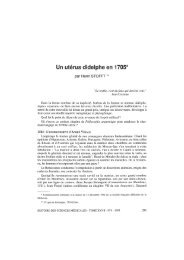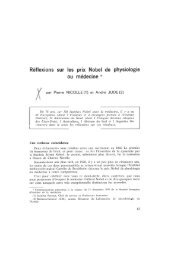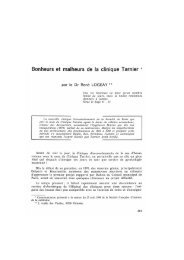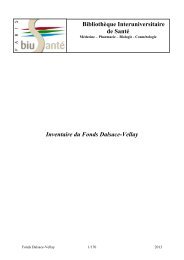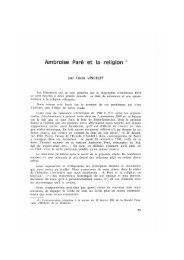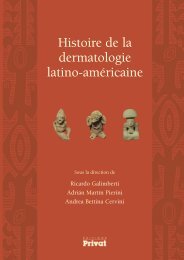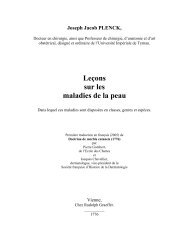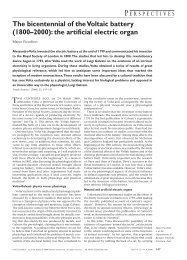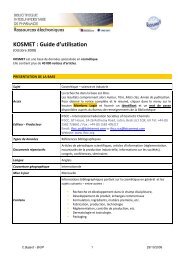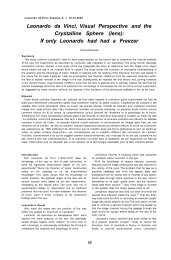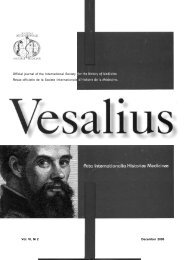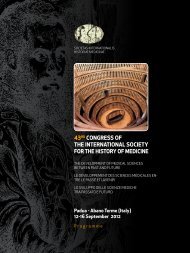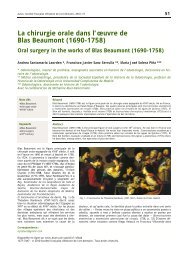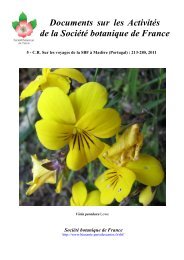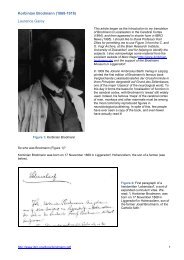histoire sciences médicales - Bibliothèque interuniversitaire de ...
histoire sciences médicales - Bibliothèque interuniversitaire de ...
histoire sciences médicales - Bibliothèque interuniversitaire de ...
You also want an ePaper? Increase the reach of your titles
YUMPU automatically turns print PDFs into web optimized ePapers that Google loves.
BAFFIONI G. - Scolii inediti di Palladio al "De sectis" di Galeno, ibid., IV (1958), p. 61 ss.<br />
BECCARIA A. -1 codici di medicina <strong>de</strong>l periodo presalemitano, Roma, 1956.<br />
BECCARIA A. - Sulle tracce di un antico canone latino di Ippocrate e di Galeno, I : Italia medioevale<br />
e umanistica, II (1959), p. 1 ss. II : Gli Aforismi di Ippocrate nella versione e nei commenti<br />
<strong>de</strong>l primo Medioevo, ibid., IV (1961), p. 1 ss. ; III : Quattro opere di Galeno nei commenti<br />
<strong>de</strong>lla Scuola di Ravenna all'inizio <strong>de</strong>l Medioevo, ibid., XIV(1971), p. 1 ss.<br />
DAREMBERG Ch. - Œuvres complètes d'Hippocrate (Paris), IX (1861), p. 430 ss.<br />
HIPPOCRATIS "De aere, aquis, locis" mit <strong>de</strong>r alten lateinischen Uebersetzung, ed. Gun<strong>de</strong>rmann,<br />
Bonn, 1911.<br />
IOHANNIS ALEXANDRINI. - Commentarla in librum "De sectis" Galeni, recognovit et adnotatione<br />
critica instruxit CD. Pritchet, Lei<strong>de</strong>n, 1982.<br />
KUEHLEWEIN H. - Die handschrifliche Grundlage <strong>de</strong>s hippocratischen Prognostikon und eine<br />
lateinische Uebersetzung <strong>de</strong>sselben, Hermes (Berlino), XXV (1890), p. 120 ss.<br />
KUEHLEWEIN H. - Die Schrift "Peri aéron, hydàton, tòpon" in <strong>de</strong>r lateinischen Uebersetzung <strong>de</strong>s<br />
cod. Paris. 7027, ibid. XL (1905), p. 250 ss.<br />
MOERLAND H. - Die lateinischen Oribasiusuebersetzungen, Symbolae Osloenses, Suppl. V<br />
(1932).<br />
NACHMANSON E. - Ein neuplatonischer Galenkommentar auf Papyrus, Minnesskrift utgiven av<br />
Filologiska Samfun<strong>de</strong>t i Goeteborg, III (1925), p. 201 ss.<br />
PALMIERI N. - Un antico commento di Galeno <strong>de</strong>lla Scuola medica di Ravenna, Physis, Rivista di<br />
Storia <strong>de</strong>lla Scienza, XXIII (1981), p. 197 ss.<br />
ROSCHER W.H. - Die hippokratische Scrift von <strong>de</strong>r Siebenzahl in ihrer vierfachen Ueberlieferung,<br />
Studien zur Geschichte und Kultur <strong>de</strong>s Altertums (Pa<strong>de</strong>rborn), VI (1913), fase. 3-4.<br />
SIGERIST H.E. - Medical literature of early Middle Ages, Bull, of the Hist, of Med. II (1934),<br />
p. 26 ss.<br />
TEMKIN O. - Studies on late alexandrian Medicine, I. Alexandrian Commentaries on Galen's "De<br />
sectis ad introducendos", ibid. Ill (1935), p. 405 ss.<br />
SUMMARY<br />
The manuscript G.180 inf. preserved in the Biblioteca Ambrosiana of Milan contains the latin<br />
translations of three hippocratic treatises (Prògnosticon, De aere, De septimanis) that were studied<br />
and published between the end of the XlXth and the beginning of the XXth century. But the<br />
second part of the manuscript is far more interesting and important. It contains four commentaries<br />
to Galen's four treatises : De sectis ad introducendos, Ars medica, De pulsibus ad tirones,<br />
Ad Glauconem <strong>de</strong> me<strong>de</strong>ndi methodo. The commentaries were composed in Ravenna between the<br />
6th and the 7th century by 'Agnellus iatrosophista" and were written by the physician Simplicius,<br />
surely one of Agnellus' pupils. But they aren't an original work by Agnellus : they are translations<br />
and combinations of original greek commentaries compilated by alexandrian scholars perhaps<br />
about the 6th century with Ammonius' and Olympiodorus' teaching method. At any rate,<br />
these commentaries testify the occurrence in Ravenna of a most active School of Medicine at the<br />
beginning of the Middle Ages. This School was a linear <strong>de</strong>scendant of the School of Alexandria<br />
and transmitted classic medical culture first to the Beneventan medicine, and then, through the<br />
Beneventan medicine, to the early Schola Salernitana.<br />
254



